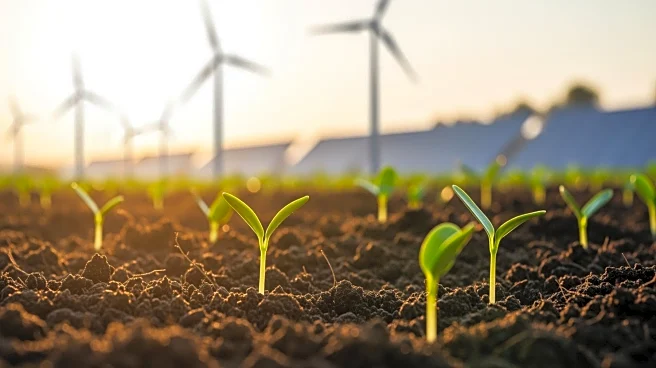What's Happening?
AGRA, an African-led institution based in Nairobi, Kenya, is calling for concrete actions at the United Nations Climate Change Conference (COP30) in Belém, Brazil. The conference, dubbed the 'Implementation COP' and the 'COP of Truth,' is seen as a pivotal
moment to drive change benefiting smallholder farmers affected by climate impacts. AGRA is urging governments, development partners, and the private sector to implement finance and policy mechanisms that enhance resilience in Africa's food systems, while also creating opportunities for youth and women. AGRA's agenda at COP30 includes promoting solutions like stronger value chains, inclusive financing models, efficient markets, and soil stewardship practices. These efforts align with the Belém Declaration on Hunger, Poverty, and Human-Centered Climate Action, endorsed by 43 countries and the European Union, which emphasizes the link between climate action and social justice.
Why It's Important?
The call for farmer-first climate solutions is crucial as Africa's smallholder farmers are among the most vulnerable to climate shocks. AGRA's initiative aims to transform these farmers from victims to active drivers of resilience and innovation. The UNEP 'Adaptation Gap Report 2025' highlights a significant shortfall in funding needed for developing countries to adapt to climate change, with current funding covering only 10% of the required amount. AGRA advocates for climate finance to flow directly to farmers and rural enterprises, emphasizing the need for reforming regulations to adopt climate-resilient seed varieties and strengthen risk-sharing instruments. This approach could unlock private investment and align donor programs with long-term national strategies, rather than temporary pilot projects.
What's Next?
AGRA's focus on delivery-first implementation at COP30 aims to ensure that commitments translate into accessible, affordable solutions for farmers. The organization is involved in the Growing Innovations showcase, a collaborative platform featuring various international partners, highlighting scalable, farmer-designed climate-smart innovations. AGRA's strategy includes large-scale investment in soil health, diversified cropping systems, and digital soil data systems for better national planning. Additionally, AGRA's youth strategy prioritizes jobs and entrepreneurship beyond primary production, creating pathways into processing, logistics, inputs, and agri-services.
Beyond the Headlines
The degradation of Africa's farmlands, with nearly 65% of productive land compromised, poses a major barrier to resilience. AGRA's advocacy for soil health and diversified cropping systems is essential for reversing declining yields and shrinking incomes. The organization's emphasis on youth financing indicators aims to retain skills and talent in the agricultural sector, fostering long-term growth and sustainability. AGRA's approach underscores the importance of tying finance to evidence-based outcomes to meet climate and food security goals more effectively.















